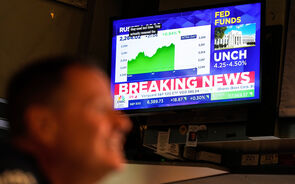Who Needs Wall Street?
2 mensagens
|Página 1 de 1
Those Wall Street Gamblers Might Not Be Bad After All
March 19, 2010
By NELSON D. SCHWARTZ
Originally, they were the good guys.
In ancient Rome, speculators were sentries who looked out for signs of trouble. By the 17th century, “speculate” meant “to consider, examine, or reflect upon with close attention,” seemingly an activity to be encouraged.
Speculators aren’t getting much encouragement these days. They’ve drawn the enmity of the left and the right, and been blamed for everything from high gas prices and the collapse of Lehman Brothers to the debt crisis that’s hit Greece.
When the Greek prime minister, George Papandreou, complained about speculators at a recent meeting with President Obama, he found a sympathetic audience. Mr. Obama himself blamed “a small group of speculators” for Chrysler’s collapse last year.
And in an attempt to protect the falling euro last week, Germany’s finance minister even suggested enlisting spy agencies to monitor “who is getting together with whom” in betting against the currency.
Perhaps its time for a reconsideration: This month marks 10 years since the technology bubble peaked, and among the few who warned of the coming implosion were speculators who had targeted tech stocks.
“If there are heroes in the financial system, these are the heroes,” said Frank Partnoy, a professor of law and finance at the University of San Diego. “They’re the people who bet against Enron, who bet against Lehman and warned it was insolvent.”
It’s not just academics who are coming to the defense of speculators. Earlier this month, BaFin, the regulatory agency that oversees financial markets in Germany, concluded that speculators weren’t behind Greece’s problems. A more likely cause was that investors were simply wary of lending the Greek government any more money following years of heavy borrowing and widening budget deficits.
So who are these speculators, and what are they doing that’s so terrible?
The popular view is that they are gamblers out to make a fast buck. They wreck companies and economies simply because they’re wreckable. They inflate bubbles that then burst with disastrous results for all of us. They get rich by inflicting pain.
This view began to emerge with the rise of stock trading in 18th-century London. By the beginning of the 20th century, the New York Stock Exchange was considered the province of speculators, with true investors preferring the safety of bonds. Today, if you listen to the critics, speculators are seemingly everywhere and wield vast power.
The former chief executive of Lehman Brothers, Richard S. Fuld Jr., blamed short-sellers for the demise of his firm, and Vikram Pandit, the chief executive of Citigroup, recently complained they’d nearly brought his bank down.
And despite new revelations of accounting tricks in Lehman’s collapse — “materially misleading” gimmicks that Lehman used to mask the perilous state of its finances, according to the bankruptcy examiner — the role of speculators in that debacle remains a hotly contested issue, both on Wall Street and in academia.
Charles Geisst, a professor of finance at Manhattan College and a historian of Wall Street, says he is convinced that speculators are at least partly to blame for Lehman’s collapse and the ensuing financial crisis.
“They knocked down the price of financial stocks and threatened the financial superstructure,” he said. Rather than warn of bubbles, he said, speculators help inflate them on the way up and deflate them on the way down.
Perhaps, but complaints about speculators usually follow a market drop, almost never a rally.
Maybe the problem with speculators, then, is that they’re not betting on stocks, bonds or anything else to go up. Instead, they’re expecting trouble, and in today’s jittery climate, that can seem like the financial equivalent of being unpatriotic.
“Every time the market goes down, they blame short-sellers and speculators,” said Jim Chanos, a famous short-seller who manages more than $6 billion and was among the earliest voices to warn about Enron as well as the credit crisis. But his trades aren’t gambles at all. “We do as much fundamental research as anybody,” he said.
If that’s the case, speculators are far from being a plague on the markets. Instead, they help reduce risk by taking on the other side of popular trades, resisting the herd mentality that creates bubbles in the first place.
The speculator “loves freedom, detests cant and abhors restrictions,” Edward Chancellor wrote in his 1999 book, “Devil Take the Hindmost: A History of Financial Speculation.”
According to Mr. Chancellor, a financial strategist in Boston, speculators aren’t motivated by greed, after all. Instead, idealism fuels their trades.
“The essence of speculation remains a utopian yearning for freedom and equality which counterbalances the drab rationalistic materialism of the modern economic system with its inevitable inequalities of wealth,” he argued in his book.
That may be going a bit far. But in the wake of a decade that saw the tech bubble burst, the collapse of Enron and Lehman and the financial crisis, perhaps the market needs more people like the original Roman speculator, on the lookout for danger.
“Granted, speculators are not angels; many are motivated by gambling and greed, and when given the chance will take advantage of the public as much as the next person,” Victor Niederhoffer, a legendary hedge fund manager and self-described speculator, has written. “But when my daughters ask me if my job is as important as the butcher’s, the doctor’s or the scientist’s, I answer that the speculator is a hero, and has been throughout history.”
Remember the Golden Rule: Those who have the gold make the rules.
***
"A soberania e o respeito de Portugal impõem que neste lugar se erga um Forte, e isso é obra e serviço dos homens de El-Rei nosso senhor e, como tal, por mais duro, por mais difícil e por mais trabalhoso que isso dê, (...) é serviço de Portugal. E tem que se cumprir."
***
"A soberania e o respeito de Portugal impõem que neste lugar se erga um Forte, e isso é obra e serviço dos homens de El-Rei nosso senhor e, como tal, por mais duro, por mais difícil e por mais trabalhoso que isso dê, (...) é serviço de Portugal. E tem que se cumprir."
Who Needs Wall Street?
By ROGER LOWENSTEIN
Mike Mayo is a veteran of six Wall Street banks. In the wake of the street’s disaster, he found refuge at a boutique brokerage and has lately taken to startling his peers with the question “What part of Goldman Sachs is good for the country?”
Regular people will be tempted to answer, “None of it,” but the question reminds us that, at least in theory, Wall Street serves society (not the other way around). And as opposed to Harrah’s, Trump Casino and their ilk, Wall Street is endorsed and regulated — with marked restraint — so as to let it perform an important task.
Because some people have savings and others need capital, some unifying force must bring the two together. Royalty once taxed its citizens and chartered corporations. Wall Street privatized this function, aggregating the savings of disparate individuals through the sale of stocks and bonds. Industry thus gained access to capital; what’s more, public markets performed a miracle of equivalence. Quotations on the stock exchange effectively calibrated, down to the penny, how many hours’ worth of wages would afford a share of General Motors.
Since the street stood at the intersection of capital and savings — or, if you will, of insiders and Main Street — the potential for conflict was rife. No firm better resisted the temptations than Goldman, which, from its founding in 1869 through recent decades, epitomized, with only rare slip-ups, the best of American finance. Serving the client was its lodestar, and its bankers were pillars of society, more conversant in literature than in the vagaries of, say, mortgage securities.
Wall Street’s emphasis began to change in the ’90s, as financiers devised new securities — the more incomprehensible, or so it seemed, the better. These instruments, in the main, did not involve selling bonds so that a DuPont could build new factories; they were rearrangements — new permutations, new alignments of risk — on flows of cash that already existed. Most famous was the trading that stemmed from complex derivatives (like mortgages) with only a remote connection to the underlying product. For all the trading in mortgage-backed securities, homeownership increased only a trivial amount.
The benefit to Wall Street was far more direct. The point of these and many other new financial instruments was to charge a hefty fee and to furiously trade them, and no one was in a better position to do that than their Wall Street creators.
If trading was, for society, a zero-sum game (someone wins, someone loses), it was, for the street, a gold mine. Greater emphasis on trading affected a subtle change in the culture, in particular at Goldman. In 1999, it sold shares to the public, diluting its long-term ethos. Its traders, formerly restrained by bankers, clamored for more of the firm’s capital.
In 2006, when Lloyd Blankfein, a onetime gold salesman, assumed command, the coup was complete. But it did not become so stingingly clear until this year, when Blankfein was induced to bare his soul before the Financial Crisis Inquiry Commission.
Asked about mortgage securities that Goldman both sold to clients and bet against, Blankfein, while expressing regret for what he admitted was improper behavior, added: “In our market-making function, we are a principal. We represent the other side of what people want to do.” He went on to say that when Goldman sells a security that subsequently goes up (i.e., on which the other party makes money), “we wish we hadn’t sold it.” So much for putting the customer first.
For much of Wall Street, capital-raising is now a sideshow. At Goldman, trading and investing for the firm’s account produced 76 percent of revenue last year. Investment banking, which raises capital for productive enterprise, accounted for a mere 11 percent. Other than that, it could have been a hedge fund.
Brokers recite, endlessly, that trading is vital because, without it, there wouldn’t be a way for shareholders to exit, thus investors would fear to commit capital in the first place. Within limits, this is true. Thus, at modest levels, the willingness of traders to buy and sell from the rest of us gooses confidence.
But the value of such “liquidity” has been vastly oversold. The notion that ever more trading makes for successively better markets is one of Wall Street’s great myths. People think liquidity will keep markets stable, but the crisis of 2008 says otherwise. In a crisis, liquidity disappears.
Modern markets are more likely afflicted with too much trading. Think of oil and its dizzying fluctuations. As the volume from speculators and momentum traders dwarfs that of long-term investors, prices gyrate further from fundamental value. Raising capital thus becomes, to paraphrase John Maynard Keynes, the byproduct of a casino.
The casino charge is most plausibly leveled at credit-default swaps, the bête noire of A.I.G., Greece and others. Such swaps let traders bet on the odds of default (of a corporate or, indeed, a sovereign bond). If swaps traded in Las Vegas — if bets against, say, Goldman’s bonds swamped the casino, causing Goldman’s lenders to refuse it credit — an uproar would ensue. This actually happened to banks in 2008.
The social utility of credit-default swaps is ostensibly the insurance function. (Fear that a bond will default? Buy a swap that pays out in the event.) But most traders do not own the bond, and they have nothing to “insure.” Like the fellow who takes a policy on his neighbor’s house, they are simply betting on disaster.
Swaps are used by banks as a hedge against risky loans, but the effect is problematic. The danger of hypertrading is that it affords an illusion of a continuously available exit; investors feel less need to scrutinize their assets. So it is with bankers. If every loan can be traded away, why worry about risk? Thanks to swaps, banks write more suspect loans and, over all, society is more exposed. At least in an actual casino, the damage is contained to gamblers. The street’s undertow is more serious. Following the debacle, the economy lost eight million jobs.
The question is whether the social balance would improve if Wall Street were less devoted to games of chance. In the 1970s, James Tobin, a future Nobel laureate, proposed a transfer tax to throw “sand in the gears” of currency markets. Tobin feared that too much trading could destabilize currencies (he has often been proved right).
The idea of a transfer tax, on financial trading generally, has resurfaced. European leaders, like Gordon Brown in England, are in favor. Timothy Geithner, the U.S. Treasury secretary, has resisted the idea. The ideal of a frictionless market is so instinctual that we have lost sight of the peril that comes with speed. Maybe it’s time to slow the markets down.
Remember the Golden Rule: Those who have the gold make the rules.
***
"A soberania e o respeito de Portugal impõem que neste lugar se erga um Forte, e isso é obra e serviço dos homens de El-Rei nosso senhor e, como tal, por mais duro, por mais difícil e por mais trabalhoso que isso dê, (...) é serviço de Portugal. E tem que se cumprir."
***
"A soberania e o respeito de Portugal impõem que neste lugar se erga um Forte, e isso é obra e serviço dos homens de El-Rei nosso senhor e, como tal, por mais duro, por mais difícil e por mais trabalhoso que isso dê, (...) é serviço de Portugal. E tem que se cumprir."
2 mensagens
|Página 1 de 1


